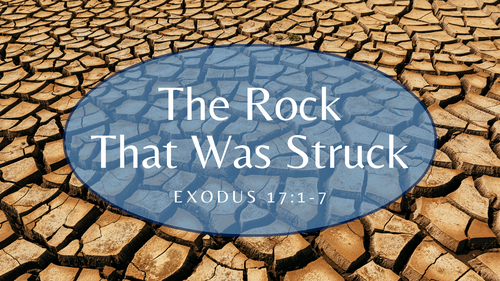Christ, the Rock That Was Struck | Exodus 17:1-7

“Behold, I will stand before you there on the rock at Horeb, and you shall strike the rock, and water shall come out of it, and the people will drink.”
Exodus 17:6
“For they drank from the spiritual Rock that followed them, and the Rock was Christ.”
1 Corinthians 10:4
The wilderness story in Exodus 17 may seem like just another stop along Israel’s journey—but it is so much more. It is Gospel terrain. It is holy ground.
When Moses struck the rock at Horeb and water poured out, it wasn’t just a miracle of hydration. It was a prophecy. A living picture of substitution. A visible foreshadowing of the cross of Christ.
And Paul, writing to the Corinthians centuries later, confirms it:
“The Rock was Christ.”
This is the interpretive key to the whole passage. The story is not ultimately about Moses, or Israel, or water, or even leadership—it is about Jesus.
Let’s unpack the glorious meaning of this shadow and see the Gospel shine through.
God Stood on the Rock
“Behold, I will stand before you there on the rock at Horeb...” (Exodus 17:6)
This is the only time in Scripture where God says He will “stand before” man. In all other places, it is man who must stand before God. But here, in an act of deep condescension and grace, God says, “I will take the position of the servant. I will stand in your place.” But He doesn't just stand near the rock. He identifies with it. He is, in essence, saying:
“Strike this rock—and in doing so, you strike Me.”
This is Christ prefigured. The Son of God would one day stand in the place of sinners. He would bear the blow of judgment. And through His suffering, living water would flow.
Martyn Lloyd-Jones wrote:
“At Horeb, God was struck instead of the people. At Calvary, Christ was struck instead of us. Both are fountains of grace for the undeserving.”
The Rock Was Struck
“You shall strike the rock…”
This is an act of judgment. It is not symbolic alone—it is penal, substitutionary, and deeply theological.
Moses’ staff, the same one that brought plagues upon Egypt, now falls on the rock. Not on the people. Not on the ground. Not into the air. On the rock.
This is the doctrine of substitution.
The people grumbled. They tested God. They deserved wrath.
But God in mercy redirects the blow—from the rebels to the Rock.
William Perkins wrote:
“Here is the Gospel in type: justice must be satisfied, but grace will provide a substitute. Christ is struck, that we may be spared.”
This is the great reversal of the cross. The innocent is punished. The guilty are satisfied. Christ is pierced, and living water flows.
Water for the Thirsty
“...and water shall come out of it, and the people will drink.”
The result of the blow is not wrath—it is refreshment. It is life. It is mercy.
This is Christ’s promise in John 7:37:
“If anyone thirsts, let him come to Me and drink.”
It is Isaiah’s call in chapter 55:
“Come, everyone who thirsts, come to the waters…”
It is the offer of the Gospel itself—salvation for the thirsty, forgiveness for the guilty, satisfaction for the soul.
Matthew Henry comments:
“From the bruised Rock flowed waters of life—grace upon grace for a murmuring people.”
And Jesus fulfills it all. On the cross, He was struck. And from His pierced side flowed both blood and water (John 19:34). The Rock was bruised—and the world was offered life.
The Striking Was Once for All
Later in the story (Numbers 20), Moses will strike the rock again. But God rebukes him.
Why?
Because the Rock only needed to be struck once. Christ died once for sins (1 Peter 3:18). The sacrifice is sufficient. It need not—and must not—be repeated.
From that point forward, Moses was simply to speak to the rock. And from that point forward, we do not strike Christ again—we call on Him in faith, and He gives us living water.
Hebrews 10:12 says:
“But when Christ had offered for all time a single sacrifice for sins, He sat down at the right hand of God…”
We do not earn it. We do not repeat it. We simply come and drink.
Let All Who Thirst Come
Exodus 17 ends not with a lesson in geography, but with a question:
“Is the Lord among us or not?”
The answer is the Rock.
If you want to know whether God is near—look to Christ. Look to the One who stood in your place, bore your judgment, and now offers you water without price.
Isaiah 12:2–3 proclaims:
“Behold, God is my salvation… With joy you will draw water from the wells of salvation.”
Come and drink.
You cannot strike the Rock. He already was.
But you can speak to Him. Cry out to Him. Trust in Him.
And He will give you water that becomes in you a spring of eternal life (John 4:14).
Conclusion: The Rock Still Flows
The story of Exodus 17 is not ancient history. It is our story. We are the thirsty people. He is the struck Rock. And the offer still stands.
Do not let your heart grow hard like at Massah and Meribah. Do not grumble in unbelief. Do not forget His provision.
Instead—come to Christ.
Come, and drink.
Come, and live.
